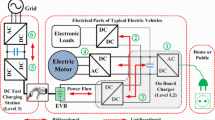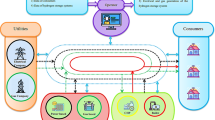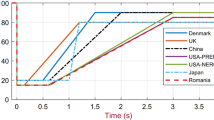Abstract
The Integrated Energy System (IES) plays a crucial role in achieving the "dual carbon" goals. In order to exploit its demand-side adjustable potential, an IES optimization model based on electric vehicles (EVs) and demand response (DR) is proposed, specifically under the carbon trading mechanism. An analysis of price-based DR mechanism is given to acquire the load profile following the implementation of DR. Besides, fitting the behavior of EVs and con-structing a charging and discharging model for EVss. According to the actual carbon emissions from the units, a carbon trading mechanism tailored for the IES is established by employing the baseline method. With the aim of trans-forming the optimization problem into a single objective problem, three objectives were considered: the lowest total system cost, the peak valley difference of the load curve, and load fluctuation. Under specified conditions, the CPLEX solver was used for the resolution of the problem. This article verifies the effectiveness through four typical scenarios. The results show that, while maintaining a relatively stable system cost, the carbon emissions are reduced by 1.60 t, and the fluctuation of the load curve is reduced by 21.5%. Therefore, the system has achieved low-carbon and stable operation while maintaining economic efficiency.









Similar content being viewed by others
References
Lee YS, Yoon HJ, Shim JW (2023) Collective power smoothing functionality of renewable energy sources with energy storage system. J Electr Eng Technol. Advance online publication.https://doi.org/10.1007/s42835-023-01727-1
Myilsamy V, Sengan S, Alroobaea R, Alsafyani M (2023) State-of-Health prediction for Li-ion batteries for efficient battery management system using hybrid machine learning model. J Electr Eng Technol 19:585–600. https://doi.org/10.1007/s42835-023-01564-2
Hongli L, Xuxia L, Kaikai W, Jingyu Z, Qiang L (2022) Day-ahead optimal dispatch of regional power grid based on electric vehicle participation in peak shaving pricing strategy. 2022 IEEE 5th International Electrical and Energy Conference (CIEEC). IEEE, pp. 1265–1270. https://doi.org/10.1109/CIEEC54735.2022.9845822
Shukl P, Singh B (2023) Distributed energy resources based EV charging station with seamless connection to grid. IEEE Trans Ind Appl 59(3):3826–3836. https://doi.org/10.1109/TIA.2023.3239583
Ali L, Imran M, Peters J, Bhandari V, Menon A, Tiwari V, Green J, Muyeen SM (2022) Blockchain-based local energy market enabling P2P trading: an Australian collated case study on energy users, retailers and utilities. IEEE Access 10:124429–124447. https://doi.org/10.1109/ACCESS.2022.3224936
Moghadam T, Farideh A, Sareh S, Akbari E, Khorramdel H, Ghadamyari M (2022) Bi-level optimization of the integrated energy systems in the deregulated energy markets considering the prediction of uncertain parameters and price-based demand response program. Energy Sci Eng 10(8):2772–2793. https://doi.org/10.1002/ese3.1166
Huan Y, Qian Z, Xiao Z, Wei H, Lan Z, Jian W (2023) Optimal scheduling strategy of electric vehicle cluster based on index evaluation system. IEEE Trans Ind Appl 59(1):1212–1221. https://doi.org/10.1109/tia.2022.3213639
Ostvar F, Barati H, Mortazavi SS (2023) Probabilistic risk-based planning of distributed generation units using multi objective hybrid augmented weighted ε-constraint approach. J Electr Eng Technol 18:3517–3531. https://doi.org/10.1007/s42835-023-01451-w
Bibak B, Tekiner-Moğulkoç H (2021) A comprehensive analysis of Vehicle to Grid (V2G) systems and scholarly literature on the application of such systems. Renew Energy Focus 36:1–20. https://doi.org/10.1016/j.ref.2020.10.001
Hao J, Huang T, Xu Q, Sun Y (2023) Robust optimal scheduling of microgrid with electric vehicles based on stackelberg game. Sustainability 15(24):16682. https://doi.org/10.3390/su152416682
Zhang Y, Liu Z, Wu Y, Li L (2023) Research on optimal operation of regional integrated energy systems in view of demand response and improved carbon trading. Appl Sci 13(11):6561. https://doi.org/10.3390/app13116561
Fan Q, Jia W, Dong L (2023) Low-carbon economic operation of integrated energy systems in consideration of demand-side management and carbon trading. Front Energy Res 11:2296–2598. https://doi.org/10.3389/fenrg.2023.1230878
Xing Y, Li F, Sun K, Wang D, Chen TY, Zhang Z (2022) Multi-type electric vehicle load prediction based on Monte Carlo simulation. Energy Rep 8(19):966–972. https://doi.org/10.1016/j.egyr.2022.05.264
Hadroug N, Iratni A, Hafaifa A, Boudjemline A, Alshammari OS, Jerbi H, Colak I, Chen X (2023) Energy efficiency improvement in photovoltaic installation using a twin-axis solar tracking mechanism with LDR sensors compared with neuro-fuzzy adaptive inference structure. J Electr Eng Technol 18:2943–2967. https://doi.org/10.1007/s42835-023-01411-4
Federal Highway Administration. (2017). 2017 National Household Travel Survey, U.S. Department of Transportation, Washington, DC. Retrieved December 18, 2023, from https://nhts.ornl.gov
Brenna M, Foiadelli F, Leone C, Longo M (2020) Electric vehicles charging technology review and optimal size estimation. J Electr Eng Technol 15:2539–2552. https://doi.org/10.1007/s42835-020-00547-x
WEl Zhenbo MAXinru GUOYi WEl Pingan LU Bingwen ZHANG Haitao. (2022). Optimized operation of integrated energy system considering demand response under carbon trading mechanism. Electr Power Construct 43(1):1–9. https://doi.org/10.12204/j.issn.1000-7229.2022.01.001
Men J (2023) Bi-level optimal scheduling strategy of integrated energy system considering adiabatic compressed air energy storage and integrated demand response. J Electr Eng Technol 19:97–111. https://doi.org/10.1007/s42835-023-01529-5
Wang Z, Yin H, Baniotopoulos C et al (2023) Net-zero energy building optimization based on simulation by african vulture optimization algorithm: Cases of Italy. J Electr Eng Technol 18(4119):4138. https://doi.org/10.1007/s42835-023-01505-z
Funding
This work was supported by the National Natural Science Foundation of China(62173074), the National Key R&D Program of China under grant (2018YFA0702200), the Key Project of National Natural Science Foundation of China(U20A2019, U22B20115).
Author information
Authors and Affiliations
Contributions
First of all, we would like to thank Ms. Liu Xinrui for her guidance. In addition, Xinyi Chen contributed more to this study, followed by Ziang Zheng.
Corresponding author
Ethics declarations
Conflicts of Interest
The authors declare no conflict of interest. The funders had no role in the design of the study; in the collection, analyses, or interpretation of data; in the writing of the manuscript; or in the decision to publish the results.
Additional information
Publisher's Note
Springer Nature remains neutral with regard to jurisdictional claims in published maps and institutional affiliations.
Rights and permissions
Springer Nature or its licensor (e.g. a society or other partner) holds exclusive rights to this article under a publishing agreement with the author(s) or other rightsholder(s); author self-archiving of the accepted manuscript version of this article is solely governed by the terms of such publishing agreement and applicable law.
About this article
Cite this article
Chen, X., Zheng, Z. & Liu, X. Integrated Energy System Optimization for Electric Vehicles and Demand Response within Carbon Trading Mechanism. J. Electr. Eng. Technol. (2024). https://doi.org/10.1007/s42835-024-01888-7
Received:
Revised:
Accepted:
Published:
DOI: https://doi.org/10.1007/s42835-024-01888-7




